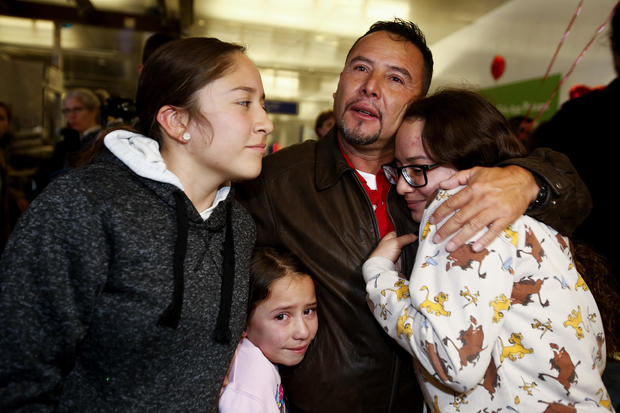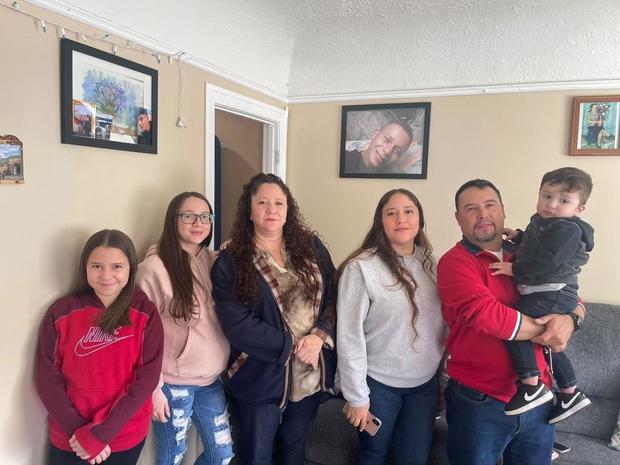Washington — Four years ago, Fernando Arredondo was sitting on a plane with his arms shackled, waiting for the U.S. government to deport him to Guatemala, which he had fled with his family after his teenage son was murdered.
Months earlier, Arredondo had been separated from his 12-year-old daughter Andrea along the U.S.-Mexico border under a Trump administration policy that sparked global condemnation. Like hundreds of parents caught up in the policy, Arredondo was deported from the U.S. without his daughter or a chance to see a judge.
When Arredondo was recently told by his lawyer that his family had won asylum in the U.S., he said he immediately thought about the forced separation from Andrea and his deportation — a period in which he lost weight, developed a urinary tract infection and fell into a deep depression.
“I don’t wish that on anyone,” Arredondo told CBS News in Spanish, referring to his time in U.S. custody. “But everything that is good comes at a cost. And thanks to God, we were able to achieve what we dreamed about the most.”
A court order allowed Arredondo to return to the U.S. in early 2020, and his emotional reunion with his wife and daughters made headlines around the world. In December, a federal immigration judge in Los Angeles granted the family asylum after finding they could be harmed by the same gang members who killed Arredondo’s 17-year-old son, Marco, in 2017. The Biden administration did not appeal the decision.
Ringo H.W. Chiu / AP
For Arredondo, being given the rare chance to live in the U.S. permanently was an odds-defying culmination to a dizzying years-long journey that began with his son’s tragic death and included separations, months in detention, a debilitating deportation and an unlikely return to America.
Under U.S. law, migrants have to prove they could be persecuted if deported because of their race, nationality, religion, political opinion or membership in a particular social group to qualify for asylum. It’s a high legal threshold that most Central Americans fail to satisfy. In fact, U.S. immigration courts deny 80% of asylum requests from Guatemalan applicants, according to federal data compiled by researchers at Syracuse University.
With the help of his attorney, Arredondo was able to show that gang members killed his son and threatened his family because they were part of a neighborhood watch that patrolled a working-class community outside Guatemala City to combat extortion and assaults by the notorious 18th Street gang.
The gang members, aided by corrupt local authorities, targeted the family because of their political opinion, the judge determined. “In sum, the Respondents’ persecutors,” the judge wrote in her decision, “viewed the neighborhood watch as anathema to their goals.”
The tight-knit family, now living in a modest home in south Los Angeles, will be able to apply for permanent residency, also known as a green card, next year. After several years, they will be eligible to become U.S. citizens, just like Arredondo’s baby son, Keyler, who was born in Los Angeles in July 2021.
“It’s going to help us in many ways, but one of them is the stability of being able to stay here legally, knowing we can give our children a better future,” said Arredondo, who works six days a week in a grocery store.
While she said she will never forget Marco’s death, Cleivi Jerez, Arredondo’s wife, noted the asylum grant has given the family some solace. Linda Dakin-Grimm, an attorney for the law firm Milbank who represented the family in court, said the decision will also offer Arredondo’s daughters, Keyli, 21, Andrea, now 16, and Alison, 10, a chance to restart their lives.
“The younger girls will finish school. They don’t have to worry about being displaced again and sent back to where things were so dangerous for them,” Dakin-Grimm added.
In some ways, however, the family’s story illustrates a rare outcome for one of the families at the center of the Trump administration’s most infamous border policy.
Courtesy of Fernando Arredondo
“We still can’t see the light”
As part of its broader effort to deter migration through harsher border enforcement policies, the Trump administration in 2017 and 2018 separated thousands of migrant parents from their children. Amid widespread bipartisan outcry, former President Donald Trump halted the policy in June 2018, days before a federal judge declared the practice unlawful and ordered officials to reunite separated families.
The administration justified the policy by saying migrant parents needed to be separated from their children so they could be prosecuted for entering the U.S. illegally. But some families, like Arredondo’s, were separated after requesting asylum at an official border crossing under U.S. law.
Nearly 4,000 migrant children were separated from their parents along the southern border under the Trump administration, according to records reviewed by a Department of Homeland Security task force established by President Biden, who has called the separations a “human tragedy.”
The task force has facilitated the reunification of more than 600 families, but it also estimates that roughly 1,000 children remain separated from their parents. Shoddy government record-keeping and the deportations of hundreds of parents without their children has complicated the Biden administration’s efforts.
Even those families who have been reunited in the U.S. face legal limbo. The Biden administration has been allowing deported parents to return to the U.S. so they can reunite with their children under a humanitarian authority known as parole, but that process does not give families permanent legal status. It simply allows them to work and live in the U.S. legally for three-year increments.
“The Department of Homeland Security has asked and continues to encourage Congress to pass legislation and provide these families with a permanent legal status in the United States,” the Department of Homeland Security said in a statement.
In early 2021, Connecticut Sen. Richard Blumenthal and Texas Rep. Joaquin Castro, both Democrats, introduced a bill that would allow migrant families separated under Trump to apply for permanent residency. But the proposal has failed to get Republican co-sponsors and faces steep odds in a divided Congress.
Absent congressional action, these families will need to apply for asylum to gain permanent status, but they are likely to face a years-long wait for a decision due to a mounting backlog of hundreds of thousands of unresolved applications. Moreover, not all families will meet the strict asylum criteria — and those who lose their cases could be placed in deportation proceedings.
Lee Gelernt, an attorney for the American Civil Liberties Union who challenged the Trump separations in court, said most reunited families don’t have lawyers who can “help them navigate the complex asylum system.” The ACLU is currently negotiating with the federal government to see if they can reach a settlement under which these families would be allowed to apply for legal status through a streamlined process.
“If these already-traumatized families do not receive lawful status, they will be sent back to the very dangers from which they fled, and potentially re-separated,” Gelernt said.
Leticia Peren, who was separated from her then teenage son, Yovany, in 2017, was also deported from the U.S. during the Trump administration. But like Arredondo, she was allowed to return to the U.S. in 2020 to reunite with him. Peren now works at a bakery in Brooklyn, while Yovany is completing his first year in college.
While Peren said she’s happy they’re together again, she expressed concern about her uncertain legal future. Yovany has won his own asylum case, but Peren’s asylum application remains pending. Returning to her native Guatemala is not an option, Peren said, citing the threats she and her son received from gang members.
“We don’t know what’s going to happen to us. We’re scared that one day they could separate us again,” Peren said, comparing the asylum process to a tunnel: “The time has passed but we still can’t see the light.”
Both Arredondo and Peren sued the federal government seeking monetary compensation for the trauma that arose from the separations. While the Biden administration initially explored settling these cases, it pulled out of these talks after Republican lawmakers expressed outrage over reports that some families could have received hundreds of thousands of dollars in settlements.
Since then, the Justice Department has been seeking to dismiss lawsuits from families seeking compensation. Peren, whose case remains pending, said she still has nightmares about being separated from Yovanny.
“It’s been five years since the separation, but the pain is still there. The wound is still there,” she said.


